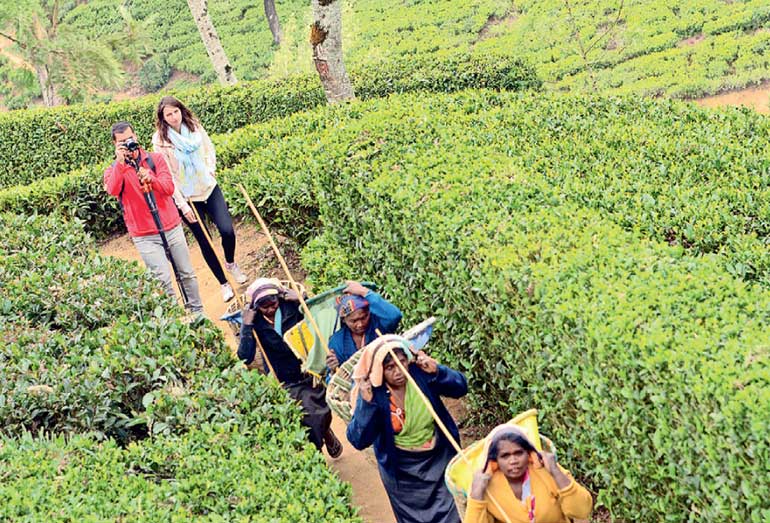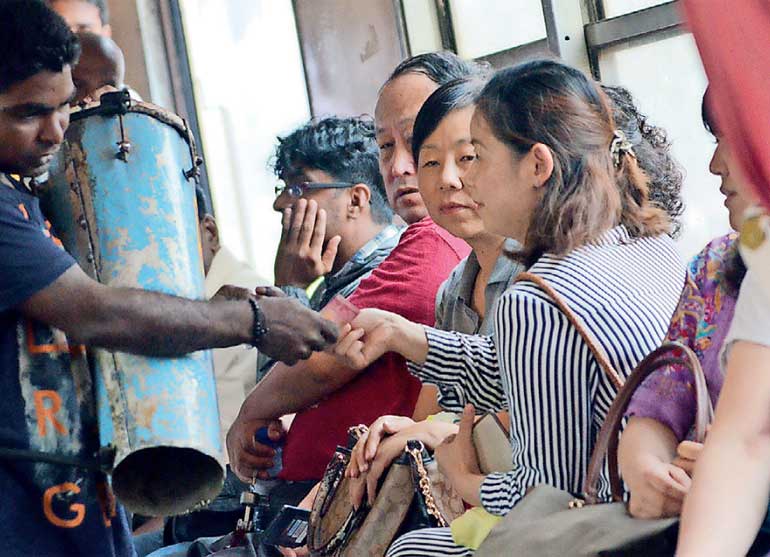Thursday Feb 19, 2026
Thursday Feb 19, 2026
Tuesday, 25 October 2016 00:02 - - {{hitsCtrl.values.hits}}
Marketing a country is like marketing a product. They must both ideally entice the customers by offering a functional benefit which also provides a motivating emotional experience. Others offering a similar product will endeavour to do the same. That’s what creates the challenge to develop and then deliver a better promise than the competitors.
A great branding proposition, has to be supported by a host of other things to make it a great experience for those who come to Sri Lanka. This article skims the surface of the many things we need to do just to stimulate thinking on these issues.
 A tourist taking pictures of tea pluckers in Nuwara Eliya
A tourist taking pictures of tea pluckers in Nuwara Eliya
Every country likes tourists. It does so many useful things for the country. What the tourists spend is revenue to many sectors. The benefits are like tentacles reaching out to many areas. It provides a return to the big investors that spent billions building fine hotels. It creates jobs in hotels for the village lads in the area. It creates business for neighbourhood restaurants, it creates income for people selling handicrafts, gems and jewellery and more fares for tuk-tuk drives and it puts a smile on the face of finance ministers as it is all in good foreign exchange.
Most countries will have marketing campaigns to lure tourists. They will focus on the attractions. Beaches, ancient ruins, beautiful scenery and whatever else they have to offer. Copywriters will string together emotive sentences. Art directors will create striking visuals that will get attention. However, like that old saying, the proof of the pudding is in the eating. What matters is not the looks but the taste.
Painting an exciting picture with words and visuals is the easy part. It is like creating a marriage proposal with an enticing picture of  a beautiful girl. But the pretty picture will not deliver the desired marriage if one went to see the girl and found she had bad breath, body odour, buck teeth and a squeaky voice.
a beautiful girl. But the pretty picture will not deliver the desired marriage if one went to see the girl and found she had bad breath, body odour, buck teeth and a squeaky voice.
What we deliver must not fall short of the expectations we created to get the tourist to Sri Lanka.
The modern tourist is skewed more towards seeking an experience than just looking at things. A view with a story attached to it creates an experience. Nice looking hotels are good, but excellent service with it creates the experience they remember and talk about. Social media is now an integral part of the lives of a high percentage of people everywhere. There is now a desire to provide via Facebook and Twitter a sort of running commentary to friends, particularly when on holiday. Personal communication is more effective than media. If we create a great experience and the two million who visit tell five friends, we get a powerful piece of promotion to 10 million.
One of the key attractions we promote are our beaches. We would not want a travel writer to say I was excited to get to Sri Lanka, but sadly what I found was that Sri Lanka beaches provide Sun, Sea, Sand, and Shit. That fourth S shit ruins what the first three Sun, Sea and Sand offer!
To prevent a great attraction becoming a negative experience we must stop sending raw sewage into the sea.
The question of dealing with sewage brings into focus the role of the Government. It must take responsibility for many things. It must for sure ensure that there are proper arrangements for sewage. Most roads on the west coast leading to hotels cross the railway line. There has to be proper level crossings. The beaches and streets near tourist resorts, and where the backpackers stay in homes must be patrolled by the Police to ensure that touts and street boys do not harass the tourists.
Tourists travelling long distances need to use toilet facilities. I went to Tanzania very recently to visit Serengetti and Ngorongoro wild life parks. There are a few things we can learn from Tanzania. There are comfort stops combined with a small cafe on the long road journey to these game parks and they are run by the government. They were spotlessly clean and all had ramps for disabled people in wheel chairs.
Visitors had to use organised safari tours. They all had four-wheel drive vehicles with six passengers so that everyone had a window seat. There was a driver guide. No separate driver and a guide. They spoke excellent English, were very knowledgeable about the animals and the birds, and of course knew where to go to find the various animals. These driver guides had to follow a three-year course and pass an exam to function as a driver guide.
 Tourists travelling by train in Sri Lanka
Tourists travelling by train in Sri Lanka
Ancient ruins are just that, they are ruins. They can be a boring collection of ruins or be transformed into something else when a good guide narrates the stories about them. Great verbal pictures about of what they looked like before they became ruins. Graphic accounts of the wars. The victories commemorated with Dagobas. Stories of the love lives of the kings, etc., will make such a difference to creating a rich experience. Tourists will not remember the size and shape of ruins but they will remember the stories. That is what creates a meaningful experience.
We have a vibrant IT industry. Many young entrepreneurs trying to create the new app that will lead to fame and fortune. I hope some of them will devote time to help tourism by developing free apps. We should have apps that will tell the stories about the sites of interest to tourists. By scrolling through they will also be able to select the places to visit. Such apps can play a major role in enhancing the tourists’ experience in Sri Lanka.
Maslow is still used for guidance by marketers when developing strategy and is very relevant for tourism. As one moves up Maslow’s triangle to more complex needs, some aspects are disputed and debated. But his view that the basic need of people is food, shelter and security is widely accepted (the basic needs are not love, recognition, or such like).
Everybody likes good food. It is universal. The first choice is the type of food you eat at home. From time to time some cuisine from another country, but not every day.
When we target Chinese tourists, we must provide what they will consider as good Chinese food. Even if everything else is good but the food is not up to the mark, it will not be a great holiday experience. The Tourism Institute should bring down cooks from China and run short courses for all the chefs in hotels that have Chinese visitors. We should do the same where Indian visitors are the target.
Maslow reminds us that security is a basic need. We have to make our Chinese visitors feel secure in the hotels. If we do not have signs, notices and menus in Mandarin and people at reception who speak Mandarin, visitors will feel insecure.
Our Indian visitors will speak English and most Europeans will understand English but we have to be careful to make our Chinese friends feel welcome and secure.
If we get everything right to create a great experience for our visitors both inside and outside the hotels, tourism will provide long-term incremental growth that impacts many parts of the economy and is inclusive of both the big private sector and the people’s private sector. There is no other activity in the pipeline that can match it.